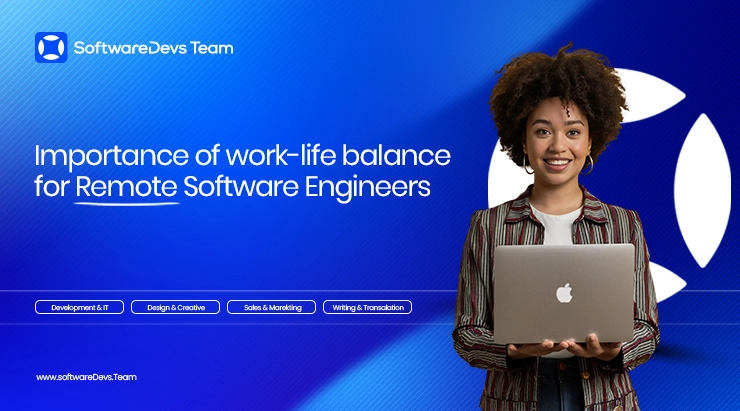The balance between remote software engineers’ duties in their private lives and work lives is called work-life balance. It means the amount of time and effort a person gives to their career and personal lives. This may concern their friends, family, hobbies, and personal development.
A remote software engineer with a solid work-life balance can devote enough time and energy to their private and work lives without affecting the other. Since many remote software engineers find it hard to balance the needs of their private lives and their jobs, the idea of work-life balance has achieved significance. We at the Software Devs Team encourage a work-life balance to ensure our remote developers are happy and content.
Effects of work-life unbalance?
Insufficient work-life balance has an impact on teams as well as individuals.
Remote software engineers may see declines in their output, a decrease in job satisfaction, and an increase in annoyance with their present position and duties. Remote software engineers who don’t have enough free time to pursue their interests are also more prone to adverse shifts in their self-perception when their performance at work is too closely correlated with it.
Poor work-life balance over time can result in chronic stress and burnout.
A severe case of both physical and mental tiredness is called burnout. Working too much and for too long with zero breaks to chill or engross in interests outside work is one of the top causes of burnout.
Burnout can induce bodily and cognitive symptoms like
- Headaches
- Exhaustion
- Insomnia
- Negativity
- Cynicism
- Detachment
If burnout is let to be continued, it can really curb a team’s ability to thrive. Teams may see drops in long-term results, growing discontent, and ultimately raised turnover.
Importance of Work-Life balance
Work-life balance is crucial for Remote software engineers.
Remote software engineers must figure out a work-life balance because it impacts their:
- Well-being
- Job happiness
- Productivity
For Remote software engineers, work-life balance is vital for the following reasons:
Preventing Burnout
Software engineering may be tiring, needing long hours and fierce focus. If the balance is off, it might result in burnout, which can bring in exhaustion, dismay, and a loss of drive. Remote software engineers can reload their fuel and return to work with revived motivation by taking time off and partaking in activities outside of work.
Boosts productivity
Studies have revealed that people who maintain a healthy work-life balance are more useful at their jobs. This is an outcome of their improved ability for time management and attention. Remote software engineers can evolve to be more attentive and invested when they get back to work after taking breaks and doing things outside of work.
Better mental health
Being employed in a software house can be arduous and mentally taxing, demanding an alert mind and focus. Stress and dread carried on by flux can be bad for mental health. Remote software engineers can enrich their mental health by taking time off and partaking in activities like
- Exercise
- Meditation
- Quality time with loved ones
Increases creativity
Taking part in extracurricular activities can also increase creativity, which benefits Remote software engineers who must solve complicated problems in novel ways. Remote software engineers can widen their ideation and add new outlooks to their work by having new ventures and ideas.
Enhances relationships at work
booking time off and partaking in activities outside of work can help improve affinities at work. Remote software engineers can foster a communal, innovative, and team-oriented work environment by cultivating good relationships with their coworkers.
Enhanced time management
Remote software engineers can:
- More effectively manage their time
- Prioritize their projects
- Fulfill deadlines
But only if they have a healthy work-life balance. By plainly defining boundaries between work and private time, they can deter burnout and boost productivity.
Improved job performance
Remote software engineers are more likely to be inspired and applied in their work when they have a great work-life balance. Better results and improved job performance for their employers may arise from this.
Improved decision-making
Remote software engineers can see their work from a distinct angle when they have taken some time off. Better decision-making, problem-solving skills, and creative answers may result from this.
Tips to maintain a work-life balance
Uncovering the ideal balance is hard. We have a few tips to make the process easier for you.
Supporting continuous learning and adaptation
Accept Lifelong Learning. Ongoing education is vital in the tech industry because of its fast-paced nature. But it is vital to strike a balance between work and leisure time. Do not put too much on yourself.
Seek support
The boundaries between work and personal life began to blur, and problems with physical and mental health were beginning to surface. It is commonly known that work-life balance improves employees’ productivity, job satisfaction, and physical and mental health.
Enhancing team inspiration and retention
The duties of a software developer can clash with social time with friends and family. Speaking with skilled managers is also useful. The capacity to properly handle one’s job duties and yet find time for interests, relationships, and other activities is known as work-life balance.
Learn to say no
You can often find yourself overloaded with requests from bosses or coworkers. But learn to say no and schedule regular breaks. Learning to say no and taking regular breaks are two more ways for software engineers to manage work and life.
Maintaining personal relationships
You must save some personal time for socializing and personal relationships. For job growth, having a strong personal network and a large professional network is vital.
Set boundaries
Make sure that the lines separating your private and work lives are distinct. This might be as easy as setting and sticking to regular work hours. For remote teams, a healthy work-life balance begins with individuals realizing their autonomy.
FAQs
How important is it to maintain the balance between work life and personal life?
Finding the perfect balance makes it possible to maintain a healthy diet, frequent exercise, and self-care. These healthy habits also support endurance and mental health, which makes it simpler to manage the demands of both personal and professional life.
As a software engineer, how do I manage my work-life balance?
Software developers can enhance work-life balance by scheduling personal activities and unplugging entirely when leaving the office.
- Set a time for hobbies and interests.
- Plan long and short vacations.
- When you are offline, remain offline.
What happens when your work life and personal life are out of balance?
Keeping work and personal life in balance can greatly lower stress levels in general. Burnout can be caused by overworking and ignoring personal obligations, which has a detrimental effect on one’s physical and emotional well-being.
How many hours do Remote software engineers work per day?
A skilled remote developer can likely get by on 20 to 40 hours of work a week, with a few 50 to 60 hours. Talk with your management to have fewer tasks given to you if you find that you are working too much.
Do Remote software engineers work more than 40 hours?
Usually, software developers work from 40-44 hours a week, with a few 50-60 hours a week depending on the work.
Is it stressful to work as a Software Engineer?
Software engineers frequently experience stress due to a variety of factors, including pressed deadlines, constant debugging, the need to stay current with rapidly changing technology, low self-esteem, low confidence, being underqualified for the position, and so forth.





